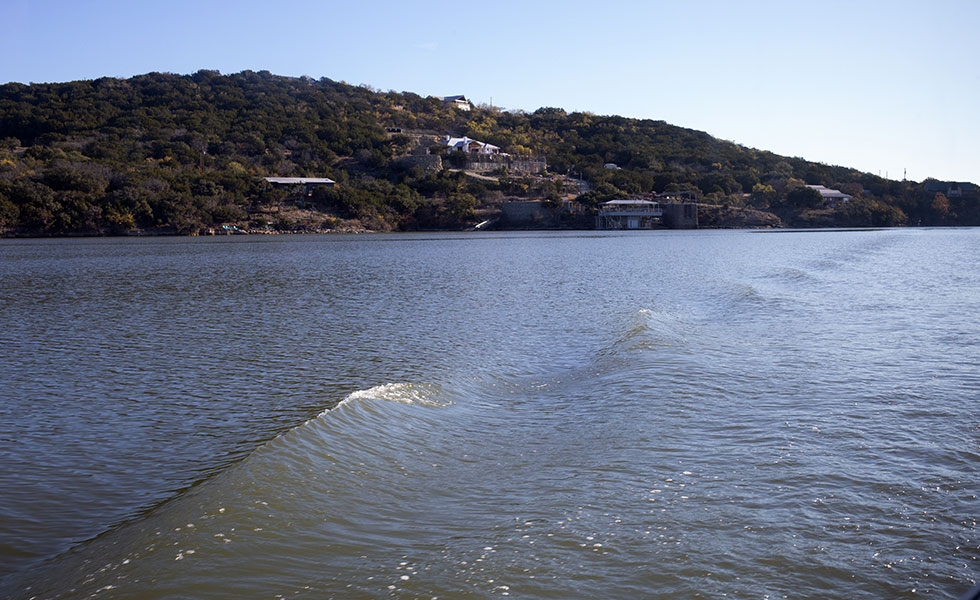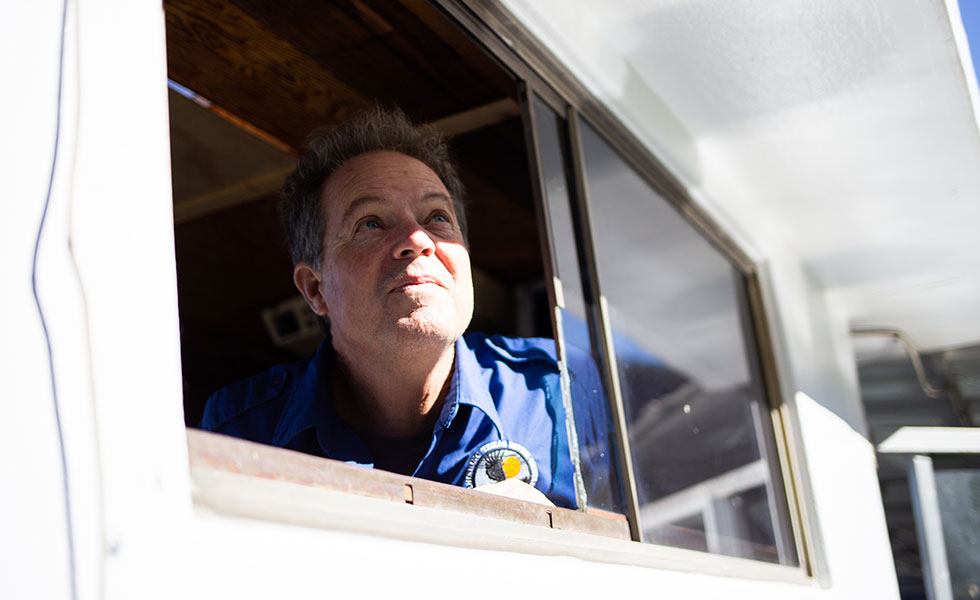Charles Tischler had no trouble spotting the white-throated caracara and red-tailed hawks wheeling through the sky above Lake Buchanan on Sunday. But those aren’t the birds that Tischler, a 68-year-old retired writer, came to this sprawling manmade lake to see.
Last weekend, he and a team of researchers from Concordia University in Austin boarded a tour boat to count the number of bald eagles that overwinter at the Hill Country lake. The annual survey of the eagle population began 34 years ago, and Tischler has been participating as a volunteer since the beginning. In past years, he has recorded dozens of the birds on these trips, which start on Lake Buchanan’s northeastern shore and end two hours upstream in Colorado Bend State Park. In 1988, Tischler counted 35 bald eagles (seven adults and 28 juveniles). He had another banner year in 1996, when he spotted 22. But in the lead-up to Sunday’s voyage, data pointed to a disturbing trend: On survey days from 2015 to 2019, an average of only four eagles were seen at Lake Buchanan—less than half of the 10.4 recorded in the five-year period before that.
At the end of this year’s trip, the team had tallied only two eagles—the lowest number ever recorded since the survey began. “It was too bad,” Tischler said. “I would have loved to see 12 eagles down there, but it just wasn’t meant to be.” The diminishing numbers could be partially explained by climate change, which has altered eagles’ migratory patterns and increasingly pushed them from southern to northeastern states. But Tischler and others who keep an eye on eagle populations at Lake Buchanan suspect an uptick in illegal duck hunting could be exacerbating the problem.

The portion of the lake favored by bald eagles sits in a river canyon where cliff walls climb to 300 feet. The cottonwood and scrub brush that cling to the cliff faces are perfect for roosting birds. Enter duck hunters, who Tischler and other advocates say have set up blinds onshore and in the water at Lake Buchanan, despite rules prohibiting hunting in the area. The canyon walls create a perfect echo chamber for gunshots, reverberating and amplifying the noise.
The Lower Colorado River Authority (LCRA), which owns the lake, has ignored the problem, Tischler says. LCRA spokesperson Clara Tuma said rangers “regularly” patrol the lake and respond to complaints about hunting, but she wouldn’t say how many employees are stationed at Buchanan specifically. The Texas Parks and Wildlife Department, responsible for enforcing the state’s hunting laws, told the Observer last month that it doesn’t patrol the lake. In recent years, the leniency appears to have created a situation in which sportsmen hunt with impunity—and they may be driving the birds to roost elsewhere.
There’s evidence to suggest that loud noises like gunshots could push the birds away. At the University of Minnesota, researchers are using sounds to direct bald eagles away from wind turbines, which endanger the birds during their annual migration. Last year, university researchers in Ireland showed that noise created by humans has an outsized effect on birds and other species.
As the eagle population continues to decline, duck hunters appear to have grown bolder. They’ve regularly set up blinds along the route chartered by the Texas Eagle, a two-deck tourist vessel that promises passengers a glimpse of the eagles during weekend cruises. During one tour in 2018, a hunter let off a shot as the boat passed a blind, spooking the passengers.

Shawn Devaney, the boat’s captain, told the Observer he’s recently seen hunters on the water. Devaney spotted them as he steered the Texas Eagle northward on a tour Saturday; on the return trip, he saw an LCRA boat had pulled up to the blind. Tuma told the Observer that rangers gave the hunters a written warning and required them to leave. The agency also removed an illegal hunting blind along the lakeshore, the official said.
Tischler, who’s largely responsible for bringing public attention to Lake Buchanan’s bald eagles, is now taking a less active role in the count. He’s handed off some of the responsibility to the Concordia University team, which is now studying the eagle population. Tischler said he’ll stay involved in the survey as long as long as his declining health allows. Still, he can’t help but wonder whether the bald eagles of Lake Buchanan will ever rebound.
“I’ll keep doing [the survey] as long as I draw breath,” he said. “But what I see as the future, if things don’t change, we’re not going to have any eagles.”
READ MORE:
-
An Incendiary New Book Reveals How Politics in El Paso Are Rigged: Who Rules El Paso? shows how a coterie of rich, primarily white Republicans control local government.
-
What the GOP’s Big Win in Fort Bend County Means for 2020: The special election runoff rout is a sobering reminder for Democrats that the GOP still dominates much of Texas. But it wasn’t the 2020 death knell that Republicans have made it out to be.
-
Controversial Anti-Abortion Activist Wants a Guarantee Her New Group Will be Eligible for Title X Funding Next Year: The argument from Heidi Group founder Carol Everett has “no logical limit,” wrote government attorneys in a recent court filing.







